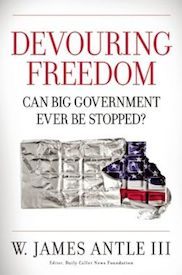Devouring Freedom: Can Big Government Ever Be Stopped
Conservative writer W. James Antle III has held editorial positions at The American Spectator, The Daily Caller and The American Conservative. His articles have appeared in publications such as The Wall Street Journal, National Review Online, Politico and the Los Angeles Times. “Devouring Freedom” is his first book, and I hope it will not be his last.
Cogent and well-informed, “Devouring Freedom” portrays our ongoing government spending binge with an impressive array of facts and figures. In 2008, candidate Barack Obama “pledged to cut the deficit in half.” Now, President Obama has presided over three of the four fiscal years since the end of World War II when federal spending exceeded 24 percent of gross domestic product. The fourth such year was fiscal 2009, which started shortly before Mr. Obama’s election, and included “the $700 billion bank bailout, which Obama supported, and the $831 million stimulus package, which he proposed and signed into law.”
Mr. Antle also reviews the astonishing surge in federal government debt under the current administration. During Mr. Obama’s first four years, he writes, “the federal government borrowed more money than it had from George Washington’s presidency to early in George W. Bush’s first term.” Moreover, campaign rhetoric notwithstanding, when “forced to address the country’s fiscal disarray, the Obama administration’s response has been to propose large tax increases and phantom spending cuts.”
Such deceptive political posturing about federal spending goes largely unpunished by the electorate because of a combination of ambivalence and ignorance about big government. As a general proposition, Americans prefer “smaller government with fewer services” over “bigger government providing more services” by a wide margin. However, “there is a degree of selectiveness” about opposition to big government,” illustrated by the fact that in 2011 even Tea Party supporters opposed “major cuts” to Social Security by a ratio of more than 3-to-1.
In addition, many Americans do not understand where the real money is in the federal budget. It’s not in public broadcasting or foreign aid, wasteful though they may be. Rather, the big spending is mainly in entitlement programs such as Social Security and Medicare, and it is a powerful — although completely unsurprising — fact that people who “draw benefits from a particular government program don’t like to see cuts, even if they take a dim view of big government in general.”
Of course, “the effects of government dependency on voting patterns” are not lost on politicians. Big government “by its very nature creates its own constituency,” even when many receiving benefits know that “high taxes and spending are generally harmful.” Moreover, some of the “fastest-growing demographic groups in the United States are assimilating into the welfare state” — 55 percent of Hispanic households “use some form of welfare.” So, as Patrick J. Buchanan asks, “Why should [a] woman vote for a party that will cut taxes she does not pay, but reduce benefits she does receive?”
The author also reminds us that the Republican Party, which “is supposed to stand for freedom, fiscal responsibility, and constitutionally limited government,” has at “crucial times done anything but that.” The book chronicles the big-government votes of various leading Republicans and goes into detail in explaining how increased spending under President George W. Bush “clearly set the stage” for Mr. Obama’s excesses, while “irreparably harming Republican fiscal credibility.”
Mr. Antle provides an instructive overview of Republican-led efforts to curtail federal spending. In particular, he reminds us that what President Harry S. Truman called the “do-nothing” 1947-48 Congress cut spending as a percentage of GDP from the 1944 high of 43.6 percent to 11.3 percent in 1948. Similarly, President Reagan won real cuts in his first term by reducing spending to 21 percent of GDP, and the 1994 cuts instigated by House Republicans had an effect as well.
The author offers some lessons to advocates of genuinely smaller government. “Government programs are like weeds” and must be “uprooted when possible” rather than “merely trimmed,” lest they grow back. Yet “big government can be curtailed, even when it is not reversed.” Republicans should note well that of the “three reforming Congresses” reviewed by Mr. Antle, “the one that was least successful at getting itself re-elected scored the most enduring victories against big government.”
For those opposed to the continuing metastasis of the federal government, “Devouring Freedom” is a valuable reference and a reality check. As the author details, the allies of more and bigger government are many, and they are powerful — big labor, big business and cronies of all stripes (especially “green” of late). Thus, while those who favor the continued growth of federal power and profligacy will not share Mr. Antle’s political views, they will take some comfort from his assessment of what a difficult political task faces the proponents of fiscal constraint and limited government.
Book Review from The Washington Times, by Ray Hartwell
Tags: Devouring Freedom: Can Big Government Ever Be Stopped, James Antle
- The Author

James Antle
W. James Antle III is editor of the Daily Caller News Foundation, senior editor of the American Spectator, and contributing […] More about James Antle.














